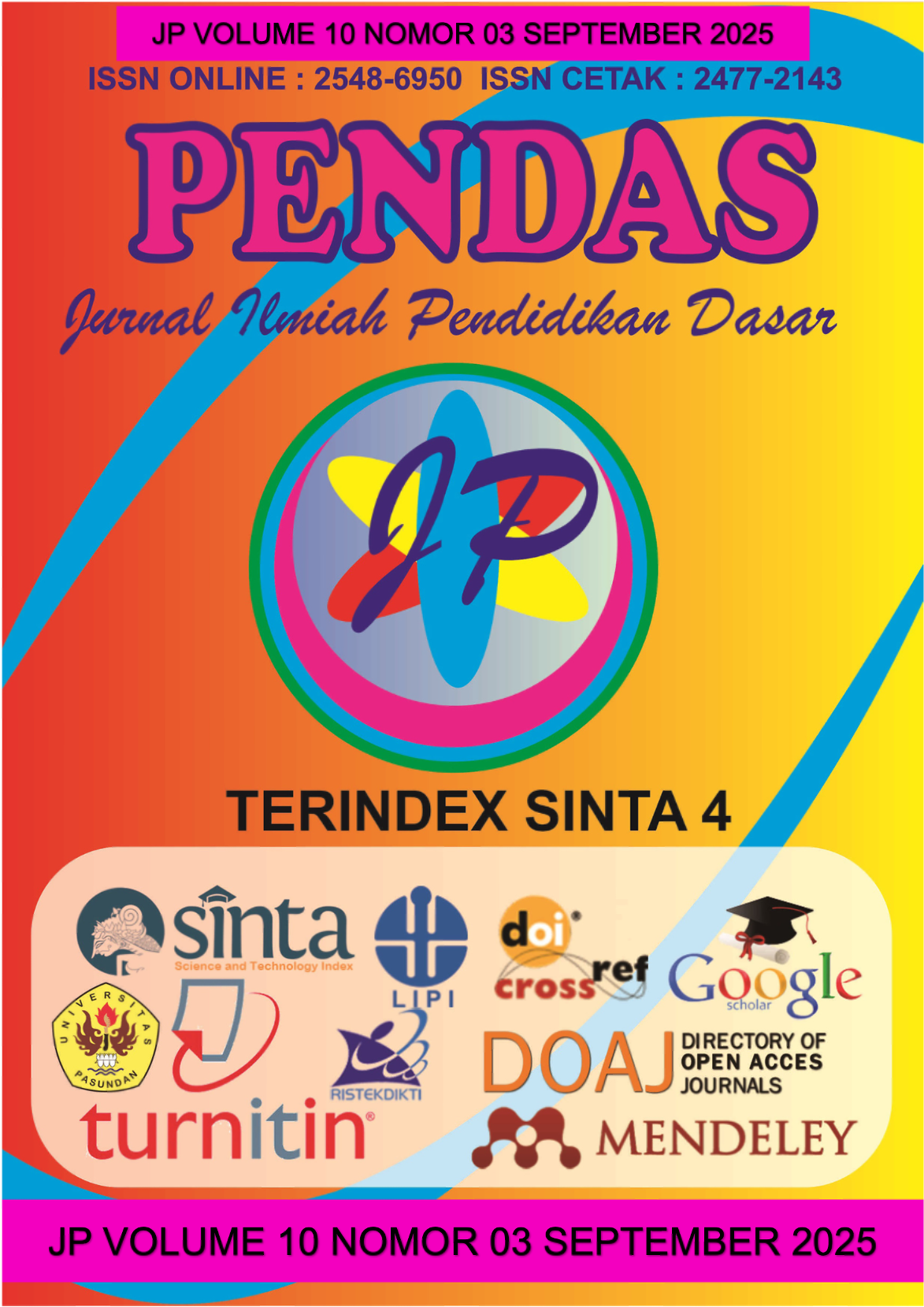PENINGKATAN KEMAMPUAN MEMBACA PEMAHAMAN MENGUNAKAN TEKNIK SCRAMBLE PADA PESERTA DIDIK KELAS 3 SD NEGERI 2 KARANGASEM KECAMATAN PLUMBON KABUPATEN CIREBON
DOI:
https://doi.org/10.23969/jp.v10i03.30412Keywords:
Keywords: Scramble Technique, Reading Comprehension, Classroom Action Research (CAR)Abstract
This research is motivated by the lack of interest in learning and the low ability of students to understand reading, especially 3rd grade students when studying Theme 6 "Energy and Its Changes" Subtheme 1 "Energy Sources". The Indonesian Language KKTP score for 3rd grade is 70, but in reality not many students can achieve that score. This indicates that learning outcomes have not been in accordance with the expectations and developments that should be achieved by 3rd grade students at SD Negeri 2 Karangasem. From the results of observations and interviews, several problems were found in learning activities, such as less interesting, monotonous learning, and students who lack enthusiasm when participating in lessons. In addition, the teaching methods used have not been able to arouse students' enthusiasm and creativity. To overcome this problem, one way that can be done is to use fun learning techniques, such as game-based scramble techniques. This study aims (1) to determine the planning of scramble techniques in improving the reading comprehension skills of grade 3 students of SD Negeri 2 Karangasem, Plumbon District, Cirebon Regency, (2) to determine the implementation of scramble techniques in improving the reading comprehension skills of grade 3 students of SD Negeri 2 Karangasem, Plumbon District, Cirebon Regency, and (3) to determine the increase in the reading comprehension skills of grade 3 students of SD Negeri 2 Karangasem, Plumbon District, Cirebon Regency after using scramble techniques? The type of research used in this study is Classroom Action Research (CAR) Kemmis and Mc Taggart Technique which introduces four stages in implementing the action method. The four components include planning, acting, observing, and reflecting. Data collection techniques use interviews, observation of student activities, observation of teacher activities, and documentation. Data analysis techniques use quantitative data and qualitative data. The findings in this study indicate an increase in students' reading comprehension skills from each cycle carried out. In the pre-cycle stage, only 14 out of 36 students (around 32%) achieved a score above the KKTP limit set, which is 70. However, after the actions were carried out in cycle I, the number of students who achieved completion increased to 30 students, or around 78%. Furthermore, in cycle II, there was another increase to 32 students who completed the test, or around 90% of the total students. This increase proves that the application of the scramble technique is proven to be effective in helping improve students' reading comprehension skills.
Downloads
References
Andriani, Wahyu, and Rizqi Fajar Pradipta. 2016. “Permainan Scramble Dalam Menyusun Kalimat Pada Peserta didik Tunagrahita.” 2(November): 43–46.
Fadilah, Risydah. 2019. “Pendidikan Islam Dan Kecerdasan Majemuk ( Multiple Intelligence ).” Al-Irsyad:jurnal pendidikan dan konseling 9(2): 62–79.
Fathurrohman, Muhammad. Belajar dan Pembelajaran Modern. Yogyakarta: Garudhawaca. 2027 Gasong, Dina. Belajar dan Pembelajaran. Yogyakarta:
Fikriyah, Fikriyah, Titi Rohaeti, and Anri Solihati. 2020. “Peran Orang Tua Dalam Meningkatkan Literasi Membaca Peserta Didik Sekolah Dasar.” DWIJA CENDEKIA: Jurnal Riset Pedagogik 4(2): 94.
Ii, B A B. 2020. “Konsep Teknik Kooperatif Tipe Scramble.” : 23–36.
Marwah, S. S., Syafe’i, M., & Sumarna, E. (2028). Relevansi konsep pendidikan menurut Ki Hadjar Dewantara dengan pendidikan islam. TARBAWY: Indonesian Journal of Islamic Education, 5(2), 24-26.
Prayogo, M. M., Mursita, R. A., & Septiany, G. A. (2015). Panduan Asesmen: Kemampuan Membaca Pemahaman Peserta didik Sekolah Dasar:(kobuku). tandabaca press.
Sugiyono, (2017). Metode Kualitatif, Kuantitatif,dan R&D. Bandung: Alfabeta
Sukendra, I Komang. I Kadek Surya Atmaja. 2020. Journal Academia Instrumen Penelitian.
Nurhabibah, P., Subyantoro, S., Pristiwati, R., & Haryadi, H. (2023). Penguatan kemampuan membaca menulis permulaan melalui budaya literasi dalam keluarga. Prosiding Seminar Nasional Pascasarjana (hal. 1152–1157). Universitas Negeri Semarang.
Sari, W., Putra, N. P., & Wahyuningsih, A. (2024, Agustus). Pengaruh media buku cerita terhadap kemampuan membaca pemahaman siswa kelas III di SDN 1 Kalibuntu. J-CEKI: Jurnal Cendekia Ilmiah, 3(5), 3698. Universitas Muhammadiyah Cirebon.
Downloads
Published
Issue
Section
License
Copyright (c) 2025 Pendas : Jurnal Ilmiah Pendidikan Dasar

This work is licensed under a Creative Commons Attribution 4.0 International License.














































